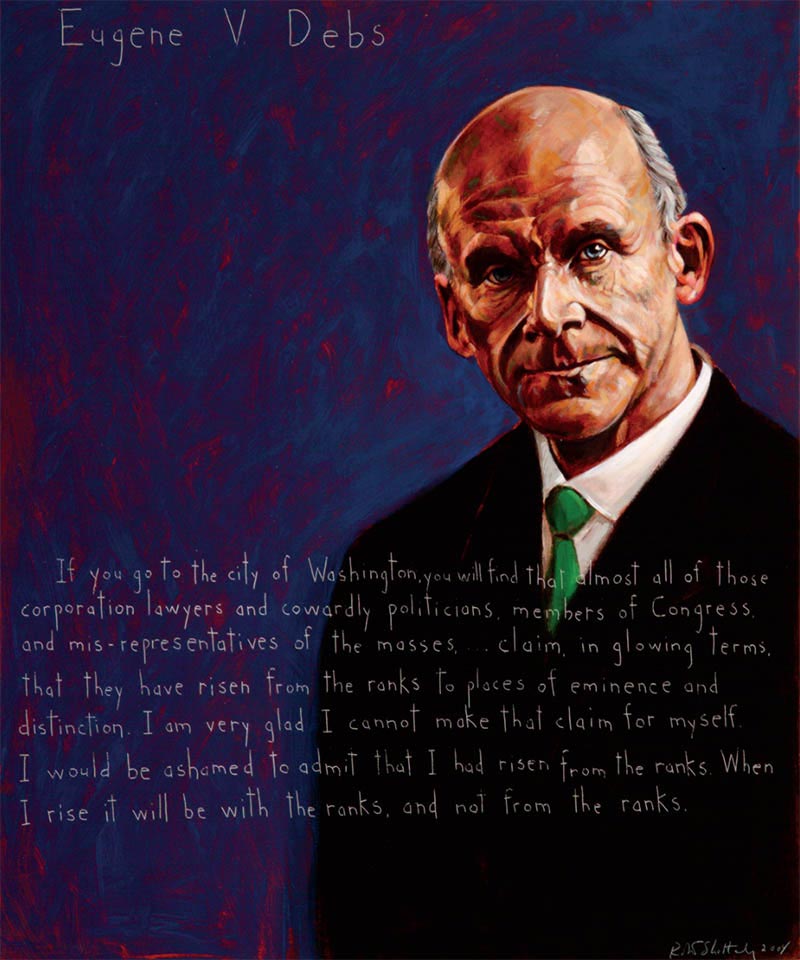
Eugene V. Debs
Socialist, Presidential Candidate : 1855 - 1926
“If you go to the city of Washington, you will find that almost all of those corporation lawyers and cowardly politicians, members of congress, and mis-representatives of the masses claim, in glowing terms, that they have risen from the ranks to places of eminence and distinction. I am very glad that I cannot make that claim for myself. I would be ashamed to admit that I had risen from the ranks. When I rise it will be with the ranks, and not from the ranks.”
Biography
Eugene Victor Debs, named by his French parents for the authors Eugene Sue and Victor Hugo, was born and raised in Indiana. He was one of the foremost proponents of social democracy in America, and advocated for fair wages, workers’ rights, social justice and equality.
At age 14, Debs left home to work on the railroads, becoming a fireman. Returning home in 1874, he worked in a grocery store and founded a new lodge of the Brotherhood of Locomotive Firemen. He became so prominent in the community through his work in the Brotherhood, including being its Grand Secretary and editor of Locomotive Firemen’s Magazine, that he was elected to the Indiana State Legislature in 1884 for one term. Feeling that the brotherhood unions didn’t do enough to fight for industrial workers’ rights, Debs organized the American Railway Union (ARU) in 1893. In 1894, during the Pullman strike over wage cuts (where workers who made the Pullman railway cars shut down production, and ARU members refused to handle the cars, including those carrying US mail), Debs was arrested and put in prison for six months. It was here that Debs read the writings of Karl Marx and turned his head toward politics and socialism.
Once released, Eugene Debs began his political career, helping to form the Social Democratic Party in 1897 with Victor Berger and Ella Reeve Bloor. He ran for President representing this party in 1900, and when the Socialist Party of America grew out of the SDP, he would be its presidential candidate four times. Debs helped organize the Industrial Workers of the World (IWW) in 1905, but left in 1908, disagreeing with the IWW´s position of not forming an alliance with any political party.
When the United States chose to enter World War I, Debs believed the decision was driven and motivated by capitalism. In 1918, he was again arrested, this time under the Espionage Act, for a speech made in Canton, Ohio opposing the war. The Espionage Act of 1917 made it a crime to give speeches or publish materials that were believed to interfere with the war effort – either in its operations, or its promotion and recruitment. In the courtroom, when Debs was sentenced to ten years in prison, he made one of his most famous speeches. He said, “Your Honor, years ago I recognized my kinship with all living beings, and I made up my mind that I was not one bit better than the meanest on earth. I said then, and I say now, that while there is a lower class, I am in it, and while there is a criminal element I am of it, and while there is a soul in prison, I am not free.” He went on to say, “I am opposing a social order in which it is possible for one man who does absolutely nothing that is useful to amass a fortune of hundreds of millions of dollars, while millions of men and women who work all the days of their lives secure barely enough for a wretched existence.” In 1920, when Debs made his last bid for the Presidency from the Atlanta Federal Penitentiary, he garnered over 900,000 votes. His sentenced was commuted in 1921, and Debs died five years later.
Debs wrote a series of columns criticizing the prison system, which were collected into the book Walls and Bars and published after his death. He was nominated for the Nobel Peace Prize in 1924. Kurt Vonnegut named the protagonist in his novel Hocus Pocus after Debs. Vonnegut also received the Eugene V. Debs Award in 1981 from the Debs Foundation. Debs’ ideas are the inspiration for Callen Harty’s 2007 play, “Debs in Prison.”
Programs
Americans Who Tell the Truth (AWTT) offers a variety of ways to engage with its portraits and portrait subjects. Host an exhibit, use our free lesson plans and educational programs, or engage with a member of the AWTT team or portrait subjects.

Education
AWTT has educational materials and lesson plans that ask students to grapple with truth, justice, and freedom.

Exhibits & Community Engagement
AWTT encourages community engagement programs and exhibits accompanied by public events that stimulate dialogue around citizenship, education, and activism.